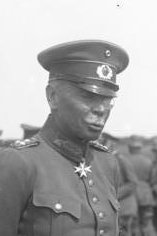Hans von Seeckt
| Hans von Seeckt | |
|---|---|

Hans von Seeckt, 1930
|
|
| Birth name | Johannes Friedrich von Seeckt |
| Nickname(s) | 'The Sphinx' |
| Born |
22 April 1866 Schleswig, Duchy of Schleswig, German Confederation |
| Died | 27 December 1936 (aged 70) Berlin, Free State of Prussia, Nazi Germany |
| Buried at | Invalidenfriedhof |
| Allegiance |
|
| Service/branch | Army |
| Years of service | 1885–1926, 1933–1935 |
| Rank | Generaloberst |
| Commands held | Eleventh Army |
| Battles/wars | World War I |
| Awards |
Pour le Mérite Military Order of Max Joseph |
Johannes Friedrich "Hans" von Seeckt (22 April 1866 – 27 December 1936) was a German military officer who served as Chief of Staff to August von Mackensen, and was a central figure in planning the victories Mackensen achieved for Germany in the east during the First World War.
During the years of the Weimar Republic he was chief of staff for the Reichswehr from 1919 to 1920 and commander in chief of the German Army from 1920 until he resigned in October 1926. During this period he engaged in the reorganization of the army and laid the foundation for the doctrine, tactics, organization, and training of the German army. By the time Seeckt left the German Army in 1926 the Reichswehr had a clear, standardized operational doctrine, as well as a precise theory on the future methods of combat which greatly influenced the military campaigns fought by the Wehrmacht during the first half of the Second World War.
Seeckt served as a member of parliament from 1930 to 1932, and from 1933 to 1935 was repeatedly in China as a military consultant to Chiang Kai-shek in his war against the Chinese Communists.
Seeckt was born in Schleswig on 22 April 1866 to an old Pomeranian family, which had been ennobled in the eighteenth century. Though the family had lost its estates, Seeckt was "a thorough-going aristocrat" and his father was an important general within the German Army, finishing his career as military governor of Posen. Seeckt followed his father into military service, joining the Army in 1885 at the age of 18. He served in the elite Kaiser Alexander Guard Grenadiers, then joined the Prussian General Staff in 1897. In 1913, Seeckt became the Chief of Staff of the III Corps based in Berlin.
At the outbreak of the First World War, Seeckt held the rank of lieutenant colonel and served as chief of staff for Ewald von Lochow in the German III Corps. On mobilisation, III Corps was assigned to the 1st Army on the right wing of the forces for the Schlieffen Plan offensive in August 1914 on the Western Front. He was promoted to colonel on 27 January 1915. In March 1915, he was transferred to the Eastern front to serve as chief of staff to General August von Mackensen of the German Eleventh Army. He played a major role in the planning and executing Mackensen's highly successful campaigns.
...
Wikipedia
